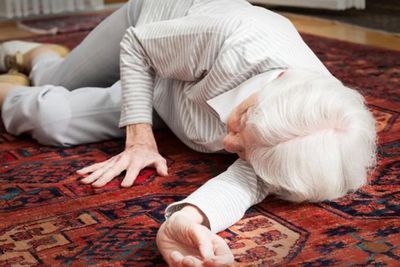Falls are serious. They're costly, too. The Centers for Disease Control and Prevention reports that, adjusted for inflation, the direct medical costs associated with injuries caused by falls tops $30 billion.
One thing that frightens me about getting older is losing my balance and falling.
And although falling is not just relegated to older people—I've taken numerous tumbles throughout my life—when you're older, the fallout, pardon the pun, is a bit more daunting and the stakes are higher. You're more likely to break a bone or pull a muscle, or worse. And it takes longer to recover from an injury.
It's also less likely we'll spring up easily from a fall, wipe ourselves off, and declare, "I'm fine!" like we might have done when we were younger. (If you do fall, pause for a moment and determine if you're hurt before getting up, because getting up too quickly can exacerbate an injury.)
When I think back to the times I've fallen, I can pinpoint exactly what I was doing and why they happened. Once, I was rushing out the door and not paying attention and didn't see a pair of shoes. Another time, I was talking on the phone as I ascended some stairs in my house and missed the first one. Splat. And yet another time, I slipped on the ice.
I'm not a klutz—I'm really not.
I'm just like everyone else.
We shouldn't take our balance for granted, although many of us do—until we take a tumble.
Poor balance can be improved with simple exercises, like standing on one foot (first, with your eyes open, then with them closed) and chair stands and squats. Tai chi and yogaare some other excellent ways to help improve not only your balance, but also your reflexes, flexibility, range of motion and leg and core strength, all of which are important in the prevention of falls.
While it's true that falling can be caused by things like certain health conditions such as low blood pressure, medications or a problem with your brain or inner ear, there are other more common, everyday contributors, like:
- Foot problems, such as painful or numb feet or wearing the wrong footwear (like high heels, backless shoes and slippers or shoes with slick leather soles).
- Rushing or not paying attention.
- Weak muscles (especially in the legs and core).
- Vertigo.
- Wearing multifocal glasses.
- Poor vision. If you need glasses, make sure you wear them! (It's amazing how many people don't.) Also, get regular eye exams, because your prescription can change: every one or two years if you're 65 or older; every one to three if you're between 55 and 64; and every two to four years if you're between 40 and 54.
- Being overly anxious about falling. While researching seniors and falling, scientists found that those with a fear of falling withdrew from physical activity and as a result, their strength diminished, thus increasing their risk of falling (sort of a self-fulfilling prophecy, I suppose).
And since more than half of all falls happen right in your own home, be mindful of your everyday routines and things around your home that might be likely culprits, like:
- Carrying heavy or bulky items up or down the stairs
- Loose rugs
- Not having stair railings
- Not having grab bars in the bathrooms
- Clutter on the floor or on the steps
- Poor lighting or improper placement of lamps
- Furniture that blocks pathways
- Wet or slick floors
More reading (for when you're sitting down!):
Winter Safety Tips for Older People
Thrown off Balance: Feeling Dizzy
Why Your Body Needs to S-T-R-E-T-C-H


